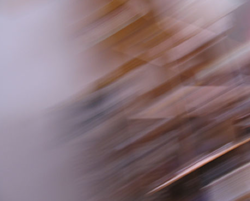
I stand at the door and greet my students. At the door, I hand them a card to find their seat. Random and quick. Once they sit down, we get started. My first day is packed. I start with a Think-pair-share. What is History? How do we study History?
The answers are the same. We read the textbook, work on vocabulary, fill in some worksheets and then take a test. This varies every once in a while, but for the majority of kids that is the study of history--and why most dislike it. I then explain this class will be a little different, as I had out a white or yellow chalk and a black 8 x 11 colored paper. I then explain to them to draw what they see on the overhead and flip it on. The image is a massive blurr. They freak out, for a second, but I calm them down and tell them to keep drawing. Over 20 minutes or so, I slowly focus the image, BUT never make it clear. During this time I have them move around the room and "See the blurr" from different angles (glare changes and the distance impacts the image). Kids are moving and guessing, making noise and "wondering".
I then ask them to talk about how this activity is like (Metaphor for) the study of history. They say some cool things:
-"I felt like I did when I open the book to read... I had no idea what I was drawing"
-"How can I be successful when I don't know what I am drawing"
-"We have to dig deeper"
-"See each topic from a different perspective"
-"Think about our fram of reference" (I explain this idea at in the first discussion)
Then I ask them to write a short paragraph on the following question: What did you learn today?
This is some of what they wrote:
"I learned that if something you see is blurry, try to learn more than what you know about the topic and soon you'll see want your looking at more clearly. What I want out of this class is being able to see things differently than I usually so. I want to be able to see the world in a whole new perspective and I think that history is the best way to do that."
"That history can be interpreted multiple ways by historians like a blurry picture, so we will be figuring things out this year...."
" I learned that not everybody sees everything the same way. This year in history will be different because I'll try to understand more and look at things from different angles. I'll try to actually think about it and not just learn facts."
"...I need to dig deeper and find out some background on the topics you are learning to "see it". "
"I learned that when you study history, you really have to sink your teeth into it. You have to look at history in a whole new and different way from everything else..."
"I learned about perspective, that you must let go of your wrong answers and let the real answer become clear as you learn."
"I learned that studying history this year will not be like other social studies classes. It will be more interesting and creative. I want to enjoy social studies more and really remember what I have learned. I think I will."
I could go on these are all from first period, I teach six periods. But I leave you with this one from six period:
"I learned that studying history will not be easy. You have to know all the facts before you can see the big picture. I want to learn history in a more fun way than reading a textbook. I think some skills I need are being patient until I know the information. I also need to not give up when I am frustrated about not being able to remember or see it all. It takes time, you even said you don't see a clear picture."
Students leave my room excited, not bored. They are engaged from day one and that carries over for the several days of relationship and trust building, then rules and procedures, but they have "bought" in to my class and as the saying goes, the rest is history.
Stay tune to see what happens next. Garth
The first day of school in 2013, I recorded this lesson. To see it click "Creating a Culture That Inspires"
 RSS Feed
RSS Feed


